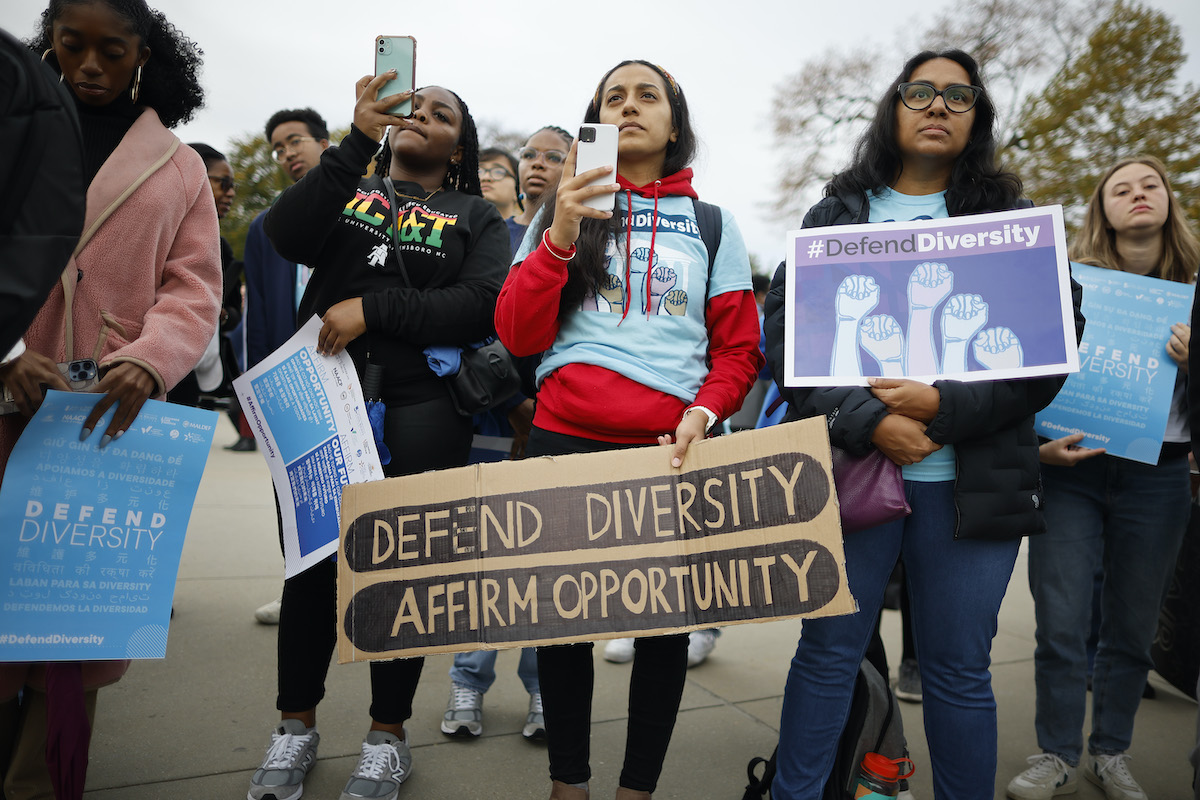Don’t Be Fooled: The Supreme Court’s Affirmative Action Decision Is Not a Win for Asian Americans

Thursday morning, the Supreme Court ruled in favor of gutting Affirmative Action in the college admissions process, rescinding nearly 20 years of heightened access to higher education opportunities for BIPOC students. The justifications surrounding this decision were, predictably, quite hypocritical and designed with dissent in mind, but one of the most egregious points made was on “behalf” of Asian American students.
The primary figure behind this case, Edward Blum, alleges that this case supposedly serves Asian Americans and protects them from college admission “discrimination.” According to Blum, who is white, Asian Americans have been unfairly weighed against other students of color because of Affirmative Action, and rescinding Affirmative Action altogether would ultimately benefit the AsAm community.
However, all of this was simply a bartering tool used by Blum in order to gather a case at all. This isn’t the first time he’s attacked Affirmative Action: In 2016, Blum attempted to bring a similar case to the Supreme Court via Fisher v. University of Texas but was aptly shut down. He’s therefore only rallied the support of Asian Americans because he knew that without another group backing his case, he’d have nothing to stand on. The man has even gone on record stating that he “needed Asian plaintiffs,” not because he cared about their perspectives, but because they were bodies and voices that could fulfill his own purposes.
It’s sickening how our community has been used to further these ridiculous ends, and it’s even more unsettling just how easily so many people have bought into this narrative. Asian Americans have always been a strange political tool because of our “model minority” status, in which we are often lumped in with white Americans on the basis of having “higher aptitude.” This is, of course, a myth, one that only truly serves the systems that uphold white supremacy by pitting us against other communities of color.
Yet because there is not much of a unified front amongst Asian Americans when it comes to politicking and solidarity, many are quick to indulge in this myth. After all, scapegoats are seductive when there are any odds at all stacked against you. Instead of directly targeting the systems in power that generate inequality in the first place, it’s easier to just point fingers at who the system points fingers at. In the case of American history and the contextual place of Asians within it, this finger often ends up being pointed at Black and Latin Americans.
However, perhaps the most frustrating thing about this whole situation is that most Asian Americans don’t actually oppose Affirmative Action. As always, there will be a vocal minority who crow the loudest about this or that, but just about 70% of Asian Americans were actually in favor of Affirmative Action. This reflects the understanding that we are people of color in a country that abides by white supremacy, and we acknowledge that what little protections POC have are worth maintaining.
The loudest grifters who are peddling this narrative that Asian Americans are being discriminated against in the college admissions process are, in fact, non-Asians like Blum, who are trying to find rhetorical talking points to make their case. They’re very blatantly, very obviously lumping Asians with white people (particularly white women) in a move to get more people on “their side.”
These people don’t care about us. They could care less about our problems. When our loved ones were being attacked in the streets, they laughed and looked away. We are yet again being weaponized against basic tenets of civil rights, and the highest frustration is that enough Asian Americans have believed it in order to align with these people and help them achieve their goals.
Now, the tensions between Asians and other people of color, particularly Black Americans, are once again bubbling to the surface. Once again, white supremacy has succeeded in pitting us against one another. And it breaks my heart, because I understand this distrust from Black Americans, as it comes from a long history of these vocal groups of Asian Americans willingly aligning themselves with the systems in power that only temporarily benefit them.
The thing of it is, this decision will not benefit Asian Americans, meaning that the groups which did align themselves with conservatives like Blum ultimately played themselves for fools:
By removing Affirmative Action from the admissions process, it is now easier than ever for ALL students of color to be discounted for their achievements, and yes, this includes Asian Americans. This decision will not be benefitting my community, and has instead served to drive an even further wedge between us and other POC in America. Most of us were not in favor of this decision, and though it might be easy to do so, I beg non-Asian people not to judge all of us by the foolish decisions made by a select few.
It’s in times like these that solidarity amongst people of color is most important. In this particular context, it is more crucial than ever to support organizations and initiatives that will continue to fight for equal access to higher education for BIPOC communities. Black, Indigenous, and Latin American communities will inevitably be hit the hardest by this decision, so we must continue to show up and advocate for them, without falling into the trap of infighting.
(featured image: Chip Somodevilla/Getty Images)
Have a tip we should know? tips@themarysue.com